Each year, the Schell Center hosts speakers whose engagement with human rights spans a diverse range of fields, methods, and subject areas. Upcoming events are featured on our website. Read about a few of the many events the Schell Center has hosted in the past year and beyond:
John Knox, “Human Rights Workshop — Climate Change and U.N. Human Rights Bodies”
March 2, 2023

John H. Knox, Henry C. Lauerman Professor of International Law at Wake Forest University, led the March 2 Human Rights Workshop. The workshop centered on Knox’s tenure as the first U.N. Special Rapporteur on human rights and the environment from 2012 to 2018.
In his talk, Knox highlighted three key tenets of applying human rights norms to climate change: that climate change interferes with the enjoyment of a vast range of human rights, that states therefore have an obligation to protect people against the effects of climate change, and that U.N. human rights institutions must provide forums to hear human rights-based climate cases.
Alyssa Battistoni, “Human Rights Workshop — After Carbon Democracy: Towards Democratic Decarbonization”
February 2, 2023

The Orville H. Schell Jr. Center for International Human Rights welcomed Alyssa Battistoni to lead the Feb. 2 Human Rights Workshop. Battistoni, Assistant Professor of Political Science at Barnard College, discussed the prospect of a democratic program for decarbonization as the world undergoes a green transition.
For decades, Battistoni explained, skeptics have warned that democratic electorates “will not accept the sacrifices necessary to reduce fossil fuel use under climate change.” According to this narrative, Battistoni explained, people will not choose to limit consumption on their own because it would require making drastic lifestyle changes for the benefit of distant strangers or future generations. Such thinkers cite pushback against policies raising the cost of fossil fuels — from the 2018 gilets jaunes in France to failures to pass a carbon tax in the U.S. — as evidence that democracy is ill-equipped to tackle climate change.
Lourdes Rivera, “Human Rights Workshop — Beyond Dobbs: Lessons from Abroad for the Fight for Reprod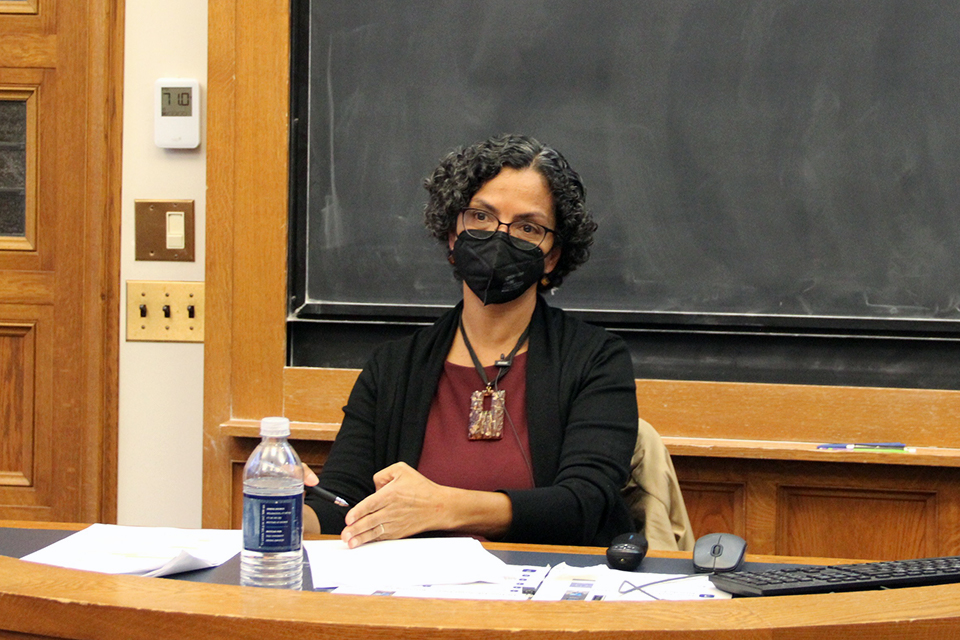 uctive Rights in the U.S”
uctive Rights in the U.S”
October 6, 2022
Lourdes Rivera ’90 offered examples from several countries to caution and inspire the United States at the Oct. 6 Human Rights Workshop. Rivera is Senior Vice President of U.S. Programs at the Center for Reproductive Rights, which uses legal strategies to advance reproductive rights as human rights around the world. The talk used as a launching point Dobbs v. Jackson Women’s Health Organization, the case in which the U.S. Supreme Court ruled that Mississippi’s 15-week abortion ban was constitutional.
“This past June, the U.S. Supreme Court overturned Roe and Planned Parenthood v. Casey, taking away an established liberty that was in place for 50 years,” Rivera began. With this decision, she said, the court overturned an “established right that many relied on.”
Nosmot Gbadamosi, “Human Rights Workshop — Targeted Sanctions as a Tool for Human Rights and Accountability”
September 29, 2022

The Orville H. Schell Jr. Center for International Human Rights welcomed Nosmot Gbadamosi to lead the Sept. 29 Human Rights Workshop. Gbadamosi, journalist and the writer of Foreign Policy’s Africa Brief column, discussed the human rights implications of the African continent’s uneven relationship with China.
According to Gbadamosi, the United States and other Western countries have long criticized China for engaging in “debt-trap diplomacy” with Africa through its Belt and Road Initiative, the massive economic development plan to connect Asia, Africa and Europe through overland corridors and maritime shipping lanes. She explained that Western countries invoke the term debt-trap to accuse China of making unsustainable loans to “make African states dependent and more compliant in siding with the Chinese Communist Party on global issues,” including Russia’s invasion of Ukraine.
Justyna Gudzowska, “Human Rights Workshop — Targeted Sanctions as a Tool for Human Rights and Accountability”
September 15, 2022
Justyna Gudzowska ’04 joined the Schell Center for International Human Rights

to lead the Sept. 15 Human Rights Workshop. Gudzowska, the Director of Illicit Finance Policy at the investigative and policy organization The Sentry, discussed her innovative work using financial pressure to create leverage for human rights.
According to Gudzowska, The Sentry focuses its efforts on the “intersection of human rights atrocities and corruption, because our investigations have shown that one tends to fuel the other, and there is a link between systemic corruption and conflict, including atrocities.” The Sentry’s work is concentrated on countries like South Sudan, the Democratic Republic of Congo, and Myanmar, which she described as “violent kleptocracies” where “institutions of the state are captured by political elites for their own gain.”
April 7, 2022
Michael Breen, “Human Rights Workshop — Human Rights in Crisis: Meeting the Moment at Home and Abroad”

Michael Breen ’11 joined the Schell Center for International Human Rights to lead the Human Rights Workshop. Breen, the President and Chief Executive Officer of Human Rights First, spoke about his organization’s evolving strategy since 2018. When Breen joined Human Rights First, he said he facedthe challenge of transforming it into “a 21st century human rights organization” 40 years after its establishment. For Breen, that meant figuring out how Human Rights First could be uniquely useful to the human rights movement. “We are living in a time of a global struggle for justice,” Breen said. “We want to be an organization that is integrated in our communities and around the world, grounded in both domestic and international work. We’re trying to be a leader in the human rights movement and it’s important to ask what capabilities we need to do so.”
February 17, 2022
Claudia Flores, “Human Rights Workshop — The Failure of the World’s Richest Countries to Restrain Law Enforcement”

Claudia Flores, a Visiting Clinical Professor of Law at Yale Law School, led the Feb. 17 Human Rights Workshop. At the workshop, Flores explained her research evaluating global police adherence to international human rights standards on use of force. As Clinical Professor of Law and the Director of the Global Human Rights Clinic at University of Chicago School of Law, she investigated a range of states’ use of “violence against their own citizenry,” particularly lethal violence. Flores noted that every state has “reserved the right” to commit violence against its citizens. However, she argued, that power implicitly threatens human rights, especially when state violence becomes lethal. “When police departments can use force against their citizens that has the potential to end a life,” Flores said, some of the most fundamental human rights are at risk: the right to life; the rights to be free from discrimination, from torture, and from arbitrary arrest; and the rights to due process and free speech and assembly.
February 10, 2022
Leilani Farha, “Human Rights Workshop — Profit Grab: When Housing Creates Homelessness”

Leilani Farha spoke at the Feb. 10 Human Rights Workshop on the financialization of housing and the international movement to secure the human right to housing. The Global Director of The Shift and the former U.N. Special Rapporteur on the Right to Housing, Farha is the protagonist in the award-winning film PUSH, which documents her work on finance, housing, and human rights. “There’s a lot of people making a lot of money off of housing, and it’s creating homelessness,” Farha said, “How has it become the reality that the richer a nation is the more likely you are to see escalating rates of homelessness? Everyone should be benefitting from the wealth of a nation, but that doesn’t happen.” Farha expressed her strong belief in human rights as an “antidote” to these injustices. “Human rights is not just a rallying cry,” she said.
September 23, 2021
Monique Clesca, “Human Rights Workshop — A Human Rights Conundrum: The Crisis in Haiti and the Need for Haitian Solutions”

At the Sept. 23, 2021 Human Rights Workshop, Monique Clesca described the origins of what she considers to be “a deep, profound, almost existential crisis” that has afflicted Haiti for years. In her presentation, titled “A Human Rights Conundrum: The Crisis in Haiti and the Need for Haitian Solutions,” Clesca recounted the first riots that catalyzed the crisis in July 2018, the government’s failure to act, and the coalition-building that has emerged as a result. Clesca is serving on the Commission to Search for a Haitian Solution to the Crisis, after a career of more than 25 years specializing in high-level policy dialogue, human rights, youth and women programming, development, and crisis communication and writing.
September 9, 2021
Baher Azmy, “Human Rights Workshop — Guantanamo: 20 Years of Lawyering in Lawless Space”

Baher Azmy, Legal Director of the Center for Constitutional Rights (CCR), spoke at the Sept. 9 Human Rights Workshop about the challenges of legal advocacy in a space that exists outside the law: the military prison at Guantanamo Bay. In his presentation, Azmy detailed cases he has litigated related to the rights of Guantanamo detainees such as Murat Kurnaz, a German resident of Turkish descent. Azmy, who also teaches constitutional law and directs the Civil Rights and Constitutional Litigation Clinic at Seton Hall University School of Law, represented Kurnaz until his release in 2006. Guantanamo, Azmy explained, is designed to maximize pressure and “create a system of learned helplessness” to overpower resistance to interrogation. Guantanamo’s legal status, Azmy suggested, contributes to detainees’ sense of helplessness. “Lawyers would tell a client, ‘Please don’t talk to interrogators,’” Azmy explained. “The most dangerous thing to the essence of Guantanamo is hope. A lawyer can say, ‘Tell me your story. I am on your side. I will help you.’”
March 6, 2021
Jorge Contesse, “Human Rights Workshop — Chile's Constitutional Awakening”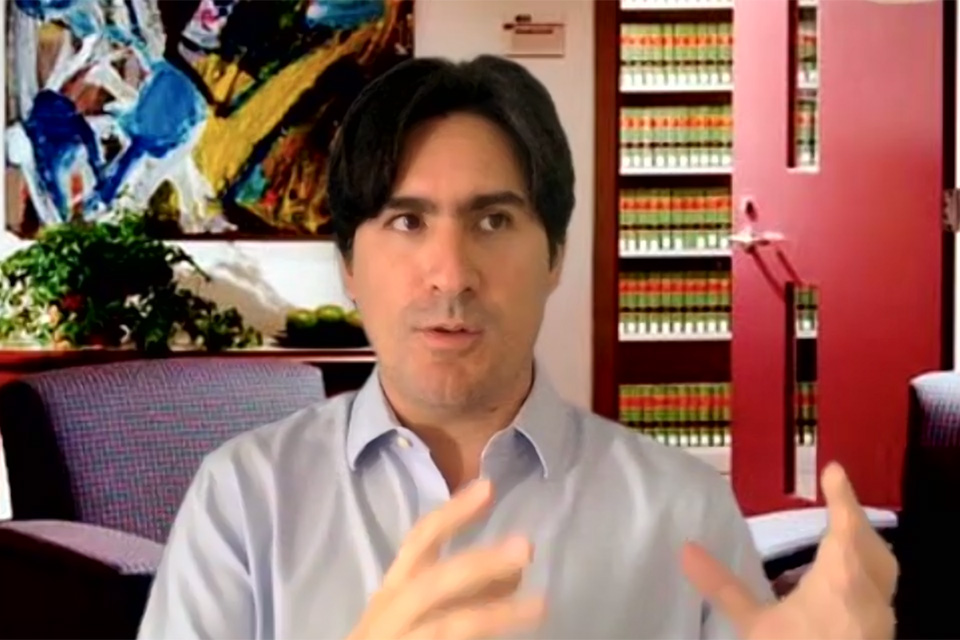
Jorge Contesse ’05 LLM, ’14 JSD provided context on the protests challenging Chile’s constitutional structure and the state’s shockingly violent response. He highlighted the rallying cry uniting many Chileans during the October 2019 protests: “It's not about 30 pesos, it’s about 30 years,” referring to the years since Augusto Pinochet stepped down up to the time of Chilean students’ and workers’ campaigns for lower public transit fares and higher wages. Decades after Pinochet left power, Contesse said, the country has seen an “organic challenge of the constitutional structure that Pinochet left very smartly in the Constitution.” Contesse is a scholar of international human rights law and comparative constitutional law, an Associate Professor of Law and founding Director of the Center for Transnational Law at Rutgers Law School, and a Permanent Visiting Professor at Diego Portales Law School, in Santiago.
February 18, 2021
Panel Discussion, “Challenging Criminalization in Feminist Advocacy: Perspectives from the Americas”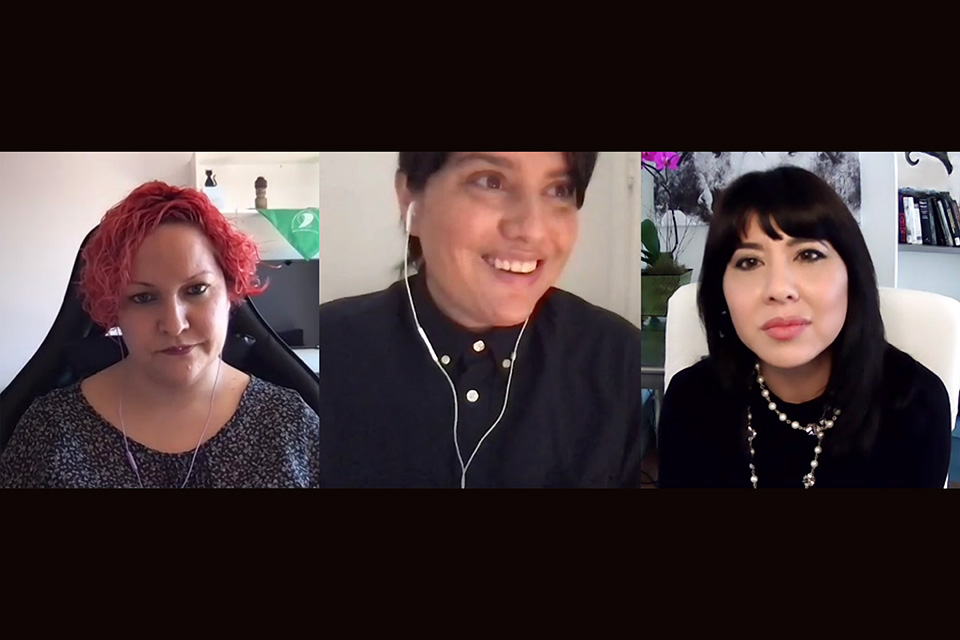
Panelists Aya Gruber, Mirta Moragas, and Estefanía Vela Barba discussed their efforts to contest the role of criminal law in feminist advocacy in the U.S., Paraguay, and Mexico, respectively. Moderated by Professor Alice Miller, an Associate Professor (adjunct) of Law at Yale Law School and the Co-Director of the Global Health Justice Partnership, the panelists reflected on the harms of criminalization that they have observed in their work and the potential for transnational solidarity among feminists skeptical of criminalization.
February 6, 2021
Kenneth Roth, “Human Rights Workshop — Human Rights and the Biden Administration”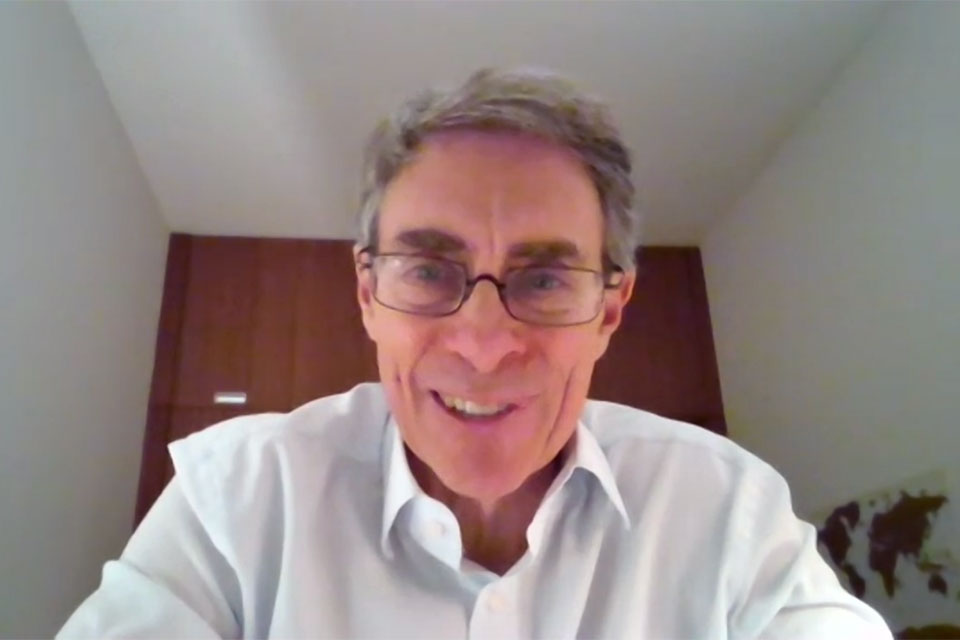
At the Human Rights Workshop, Executive Director of Human Rights Watch Kenneth Roth addressed the future of human rights in American foreign policy under President Joe Biden. He believes that President Biden’s foreign policy challenges lie beyond simply “making amends” with allies; instead, he said, Biden must reinspire trust among the country’s “natural partners” and confront China and Russia's efforts “to undermine the global system of human rights.” The “most fundamental” challenge facing Biden, he concluded, is obstructing future U.S. leaders’ ability to abandon human rights the way former President Trump did.
February 6, 2020
Marbre Stahly-Butts, “Radical Lawyering for Liberation”
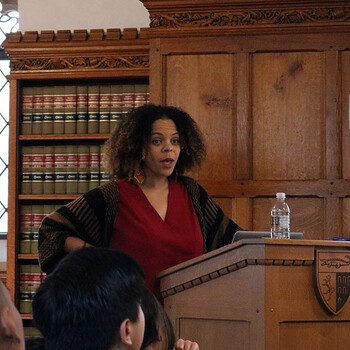
Marbre Stahly-Butts ’13 discussed her work with Law For Black Lives, an organization focused on building a “responsive legal infrastructure” for movements including Black Lives Matter to “advance and actualize radical policy.” As the Executive Director of Law for Black Lives, Stahly-Butts also spoke about movement lawyering and its politics, theories of social change, and radical reform and reparations. According to Stahly-Butts, a movement lawyer is one who “supports and advances social movements,” helps legitimize “collective power,” and aids in the “transformation of the systems that created these [oppressive] conditions.” Movement lawyers, Stahly-Butts said, recognize that the “law is one of many tools [to drive change], but not always the best one” and they “relinquish their privilege in order to stand up for justice.”
November 15, 2019
Nathan Law, “Hong Kong on the Brink: A Struggle for Survival”

Activist Nathan Law GRD ’20 spoke at the Schell Center in November about his involvement in the escalating protests in Hong Kong and the future of the region’s pro-democracy movement. Law, then a Yale graduate student in East Asian Studies, was a leader of the 2014 Umbrella Movement, which advocated for democracy and self-determination in Hong Kong. Law emphasized that “Hong Kong is in a difficult battle” where “there are huge power imbalances” between the Hong Kong government, the Beijing government, and the people of Hong Kong. However, Law observed that the people of Hong Kong are “not alone in such a global fight” against the “revival of tyranny and the recession of democracy.”
February 7, 2019
Masih Alinejad, “Women as Agents of Change in Iran”
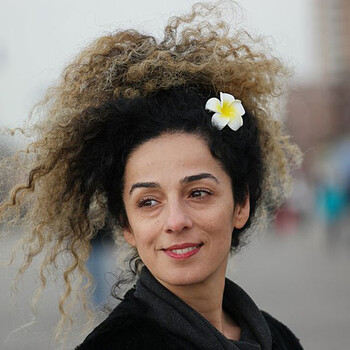
Masih Alinejad visited the Schell Center in February to talk about her activism for women’s rights in Iran. Alinejad’s fight against compulsory hijab laws, which she began in 2014, is now the largest civil disobedience campaign in the history of the Islamic Republic of Iran. Alinejad dismissed the assumption that opposing compulsory hijab laws legitimizes Islamophobic sentiment in the West. She called in particular on feminists in the West to support their Iranian counterparts' efforts to dismantle the discriminatory regime.
April 4, 2018
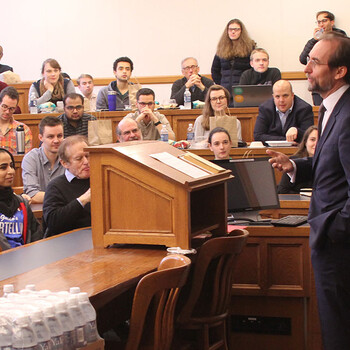
Zeid Ra’ad Al Hussein, “Human Rights Today” from Commissioner for Human Rights
With the Fox International Fellowship and the MacMillan Center for International and Area Studies, the Schell Center hosted U.N. High Commissioner for Human Rights Zeid Ra’ad al-Hussein. Al-Hussein spoke about rising hostility to human rights causes and advocates around the world and declining trust in international human rights institutions such as the International Criminal Court. Al-Hussein urged his audience to fight for human rights with not just law, but also with political advocacy. “You can do anything else,” he told the audience, “but be a human rights defender. It won’t be easy, but I guarantee it will be the most meaningful part of your life.”
April 3, 2018
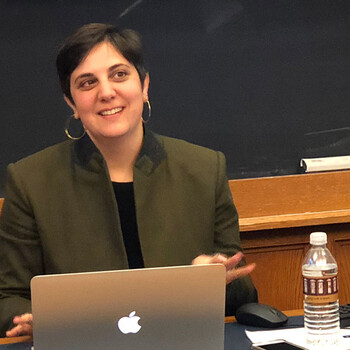
Sirine Shebaya, “Fighting the Many Faces of the Muslim Ban”
Sirine Shebaya ‘12, a senior staff attorney at Muslim Advocates, discussed her work defending the civil rights of Muslim, Arab, and South Asian communities in the United States. She focused her talk on the practices and policies that have threatened Muslims since President Trump took office, beginning with but extending far beyond the travel ban barring migration from certain Muslim-majority countries. Shebaya emphasized how the travel ban, other Trump-administration policies, and increased scrutiny by immigration and law enforcement have chilled Muslim civil society and slowed down Muslim immigration to the United States. She concluded by stressing the need to fight against the normalization of these discriminatory policies.
March 28, 2018
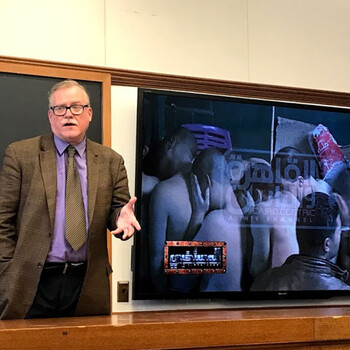
Scott Long, “Gender and Sex in the Arab Winter: Body Politics and the Limits of Human Rights”
Scott Long, the founder and former director of Human Rights Watch’s Lesbian, Gay, Bisexual, and Transgender Rights Program, spoke at the Schell Center about LGBT rights movements in the Middle East. Like many speakers this semester, Long argued that theories traditionally held by many human rights activists – namely, that violators of human rights can be swayed by moral arguments – are no longer reliable, because criticism by other countries or human rights advocates is not causing autocratic leaders to budge. To Long, one potential alternative strategy to naming and shaming is to deploy the “body as a resource in material struggles.” As Long explained, many gender and LGBT activists have been doing this for a long time, because LGBT rights implicate the relationship between the public and private, between the state and the human body, etc. Long described Egyptian activists who are using tactics such as physically shielding women from sexual harassment during protests. He said that such activists inspire him because they remind us that victories can still happen, even in situations where there are serious human rights violations.
October 16, 2017

Binger Inaugural Lecture with Professor Jim Silk '89, “From Nuremberg to the Netherlands to Nineveh? The Book of Jonah, International Criminal Justice and the Promise of Human Rights”
In October, Schell Center Co-Director Jim Silk delivered the Inaugural Lecture for the Binger Clinical Chair in Human Rights. The Robina Foundation endowed this professorship as part of its January 2017 $13-million gift to the Law School. In his talk, Silk described his youthful veneration of the Nuremberg Trials, which began to waver as he studied the trial of Ivan Demjanjuk in Israel and worked for Justice Aharon Barak during Demjanjuk’s appeal. His misgivings about international criminal justice grew as tribunals for the former Yugoslavia and for Rwanda and the International Criminal Court were established and the discourse of human rights increasingly invested its support and hopes in international criminal justice rather than on addressing systemic human rights violations — in other words, holding individuals retrospectively accountable rather than holding states contemporaneously accountable. Silk concluded his lecture by interpreting the biblical Book of Jonah, a morality tale that has long fascinated him, to address his concern that the enthusiasm for retributive justice endangers the most fundamental principles of human rights.
